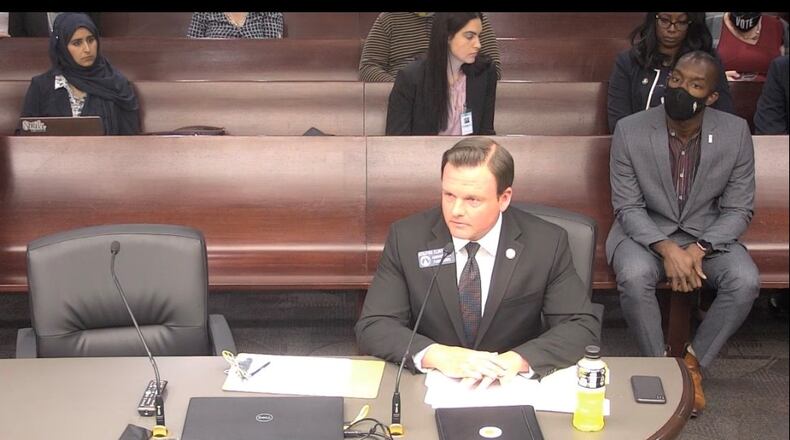A GOP legislator has pulled back his surprise plan to dramatically retool local government in Gwinnett County – for now.
Republican state Sen. Clint Dixon temporarily retreated from his push to revamp the county after Democrats blasted proposals that would have nearly doubled the number of seats on the Board of Commissioners, weakened the power of the commission chairperson and made school board members run in nonpartisan elections.
Critics saw the bill, which would also redraw Gwinnett’s election maps, as a GOP effort to counter Democratic success in the state’s most diverse county. Democrats in November 2020 flipped control of the county for the first time in nearly three decades, cementing the suburb’s transformation from a GOP bastion to a liberal stronghold.
Dixon, a freshman legislator and floor leader for Gov. Brian Kemp, said Tuesday that he’ll wait to revive his effort until January, though he said he’d pursue a statewide plan to make all school boards nonpartisan.
“I look forward to working with my colleagues in the Senate and the House to get both of these bills on the governor’s desk in the first part of next year,” Dixon said.
Dixon blindsided his Democratic colleagues and bipartisan local officials who quickly mounted a campaign to defeat the changes after The Atlanta Journal-Constitution first revealed the plans last week.
“I’m glad they came to their senses and realized this bill was terrible,” said Everton Blair, a Democrat who serves as chair of the Gwinnett County Board of Education.
Dixon said he proposed the changes to give better representation to fast-growing Gwinnett by allowing more members to focus on local issues. He also said he wanted to prevent partisan politics from influencing children and that he’s unhappy with the school board’s direction.
“The education of our children should be a nonpartisan issue,” said Dixon at a committee hearing last week.
Democratic legislators, local leaders and advocacy groups worry the proposed changes would lead to less minority representation, create inefficiencies in local government and add a financial burden on taxpayers.
Nicole Love Hendrickson, the county’s first Black chairwoman, said last week the move would have disenfranchised the voices of the nearly 1 million residents who call Gwinnett home. In a Tuesday statement, she commended Dixon for holding off on the bills.
“Because of support from our Gwinnett delegation and grassroots efforts by our community members, (the bill) will go through the legislative process it deserves,” Hendrickson said.
Changing Gwinnett
Democrats now command the Gwinnett school board, hold every seat on the county commission and lead the sheriff’s department, the District Attorney’s office and several other countywide positions.
Everyone on the five-member commission board is a person of color, and about 68% of Gwinnett residents identify as nonwhite.
Under the proposed maps, nearly all districts would have been majority-minority when all minority populations are combined. But white residents would have been the largest voting bloc in terms of individual race in five of nine commission districts and three of five school boards districts.
Credit: Eli H. Spencer Heyman
Credit: Eli H. Spencer Heyman
State Rep. Donna McLeod, D-Lawrenceville, said the proposals stem from fear of the changing and diversifying county. State Rep. Gregg Kennard, also a Lawrenceville Democrat, said the move amounted to “whitelash.”
“It’s an issue where they see people of color, they’re seeing a change in demographics, and they don’t know how to handle themselves,” McLeod said. “Why don’t you just work on giving us good policies that people will want to vote for you for?”
Some Republicans accused the critics of fearmongering. State Rep. Chuck Efstration, R-Dacula, disagrees with the assessment of the maps and said the overhaul would increase participation from minority communities in future elections by creating new government posts.
“Increasing the size of the county commission would allow for more compact districts, where commissioners would represent fewer constituents and would allow for the concerns or issues of their respective districts to be effectively represented,” Efstration said.
Republican legislators say discussions to expand the Board of Commissioners have been ongoing for years. State Rep. Pedro Marin, D-Duluth, tried to add two seats to the board in 2017.
Democrats say they invited Republicans and local officials in 2017 to the table to collaborate. They also solicited public input and pitched it during a regular session.
Local legislation is only intended to come forward during the special session if it is necessary to avoid unreasonable hardship or avoid undue impairment of public functions, according to a proclamation from Gov. Brian Kemp.
“I think that what they proposed wasn’t very well thought out, and more concerning than that, even, was just the fact that they didn’t bother to reach out to us,” said Steven Knudsen, a Republican school board member facing reelection next year.
Dixon also announced plans to try to ban comprehensive sex education and critical race theory — an academic concept based on the idea that racism is embedded in all aspects of life, including in legal systems and policies — from being taught in schools.
There is no evidence that the graduate-level theory is taught in K-12 schools.
Public backlash against the school board grew vitriolic as members voted along party lines in March to end former Superintendent J. Alvin Wilbanks’ contract a year early.
Parents and community members — mostly white — now denounce the school district’s mask mandate and critical race theory, which district leaders maintain is not taught in schools. Parent-led protests against the mask mandate have shut down two school board meetings since May.
Dixon said he plans to hold town hall meetings to gather public feedback and now work with local officials on changes to the two local government boards before re-introducing the legislation.
Gwinnett commissioners, in the meantime, will continue holding their own town halls and redrawing their maps for a five-member board.
“I am grateful for everyone who joined together in this fight to stop this partisan power grab by a handful of Republican lawmakers,” said County Commissioner Kirkland Carden.
AJC Staff writers Alia Malik and Greg Bluestein contributed to this report.
ABOUT OUR REPORTING
The Atlanta Journal-Constitution started following SB 5EX and 6EX before the bills were formally introduced. Gwinnett County officials alerted the paper of vague notices posted in a local newspaper that an unknown legislator intended to introduce local legislation during the 2021 special session to make changes to the Gwinnett County Board of Commissioners and Board of Education. The AJC learned about the details of the bills the night before state Sen. Clint Dixon introduced them. The AJC broke the story the next day and continued to monitor the bills as they went through committee hearings, where local stakeholders rebuked them.
About the Author
Keep Reading
The Latest
Featured



